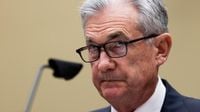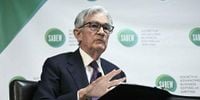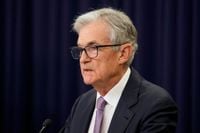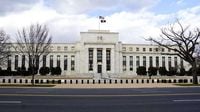Federal Reserve Chair Jerome Powell addressed the potential economic impacts of President Donald Trump's recent tariff announcements during a speech on April 4, 2025, at the Society for Advancing Business Editing and Writing conference in Arlington, Virginia. Powell warned that the new tariffs are likely to raise inflation and slow economic growth, making the outlook for the U.S. economy increasingly uncertain.
In his remarks, Powell described the tariff increases as "significantly larger than expected," emphasizing that the economic effects could be more substantial than initially anticipated. He noted that the tariffs, which include a sweeping 10% levy on all imports and higher reciprocal tariffs on specific countries, could lead to a rise in inflation and a slowdown in economic growth.
"It is now becoming clear that the tariff increases will be significantly larger than expected," Powell stated, highlighting the potential for persistent inflationary pressures. He remarked, "The same is likely to be true of the economic effects, which will include higher inflation and slower growth." This acknowledgment comes as the stock market has reacted negatively to the tariff news, with the DOW, NASDAQ, and S&P 500 all experiencing declines reminiscent of the early pandemic days.
Powell indicated that the Federal Reserve would remain vigilant in its efforts to keep inflation in check, despite the potential for tariffs to push prices higher. He explained, "Our obligation is to keep longer-term inflation expectations well anchored to make certain that a one-time increase in the price level does not become an ongoing inflation problem." The Fed's dual mandate involves maintaining both low inflation and full employment, and Powell's comments suggest that the central bank is assessing how best to navigate these challenges.
As the economic landscape shifts, Powell noted the U.S. labor market remains "broadly stable," with a recent jobs report indicating that unemployment has ticked up to 4.2%. Employers added approximately 228,000 jobs in March, a sign of ongoing resilience in the labor market. However, Powell also acknowledged rising concerns among consumers regarding inflation and future growth prospects.
The tariffs have sparked fears of stagflation, a term used to describe a stagnant economy combined with high inflation. Powell's caution reflects a broader anxiety within the financial community about the potential for higher unemployment and inflation rates. He stated, "The outlook for the U.S. economy is still highly uncertain, with elevated risks of both higher unemployment and higher inflation." This uncertainty is compounded by the aggressive nature of the tariffs, which some economists predict could push inflation from 2.8% to as high as 4% or more by the end of the year.
Trump's tariff strategy has drawn mixed reactions, with the president maintaining a positive outlook. In a recent interview, Trump claimed, "I think it’s going very well," likening the economic adjustments to a patient recovering from surgery. He has repeatedly urged Powell to cut interest rates, suggesting that the Fed's current stance is overly cautious. On his social media platform, Trump stated, "This would be a PERFECT time for Fed Chairman Jerome Powell to cut Interest Rates. He is always ‘late,’ but he could now change his image, and quickly."
Despite these pressures, Powell signaled that the Fed would not rush to adjust interest rates until there is greater clarity on the economic impacts of the tariffs. He stated, "We are well positioned to wait for greater clarity before considering any adjustments to our policy stance. It is too soon to say what will be the appropriate path for monetary policy." This cautious approach reflects the Fed's commitment to balancing its dual mandate while navigating the complexities introduced by the tariffs.
Investors are closely monitoring the situation, with futures markets pricing in a series of interest rate cuts beginning in June. Analysts anticipate that the Fed may reduce its key borrowing rate by at least a full percentage point by year-end. However, Powell's recent comments suggest that the central bank may maintain a more cautious stance, especially in light of the tariff-induced uncertainties.
While some economists believe the tariffs will result in only a temporary inflation spike, others worry that the broad nature of Trump's tariff policy could lead to more entrenched inflation expectations among consumers and businesses. Powell noted, "While tariffs are highly likely to generate at least a temporary rise in inflation, it is also possible that the effects could be more persistent." He emphasized that avoiding this outcome would depend on keeping longer-term inflation expectations well anchored and understanding the size and duration of the tariff effects.
The Federal Reserve's challenges in the wake of these tariffs underscore the delicate balance policymakers must strike. As Powell stated, "While uncertainty remains elevated, it is now becoming clear that the tariff increases will be significantly larger than expected." The Fed's ability to navigate these turbulent waters will be crucial in determining the trajectory of the U.S. economy in the coming months.
As the situation evolves, both the administration and the Federal Reserve will need to adapt their strategies to mitigate the potential economic fallout from these unprecedented tariff measures. The outcome remains uncertain, but the stakes are high for American consumers, businesses, and the broader economy.







